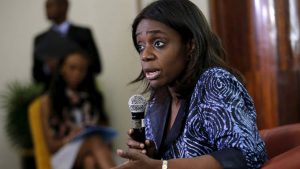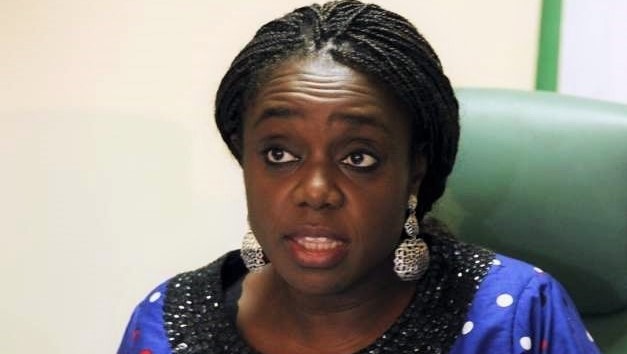The Federal Government, in a bid to stimulate economic activities, on Friday said that it would release additional N350bn for capital projects captured in the 2016 budget.

The Minister of Finance, Mrs. Kemi Adeosun, gave the figure while briefing journalists on intervention measures being taken by the government to reflate the economy which is currently in recession.
She said that the provision of the additional N350bn brought the total capital releases made by the government to N760bn.
She said since the economy is currently in recession, the level of consumer demand would be reduced drastically hence the need for government to step in by injecting liquidity.
She said, “What government wants to do is to step in and begin to spend and push more money into the economy and then get things moving again.
“Since the budget was passed in May, we have released and cash-backed fully N420bn capital releases. As we speak now, we are about releasing another N350bn that’s between May and now.
“Of the sectors we spent the money on, of course the largest had been power, works and housing. Quite a lot has gone on defence, because we need to rebuild the credibility of our army to continue in their efforts in the new phase; also interior and transport.”
The minister said out of the N350bn, the government would be setting aside N60bn for the implementation of the social intervention programme.
She said the implementation of social safety schemes was vital as it would enable the government to provide direct cash of N5,000 to vulnerable Nigerians.
She said, “There will also be the funding of about N60bn in the social intervention programme and that’s very important in terms of putting money into people’s pocket.
“Those are the programmes that we really cash-backed. The N5,000 to some of the poorest and most vulnerable, the home school feeding programme, which is very important.
“That will also generate economic activities in a lot of our local governments with women and maybe men cooking for the children.
“The graduates that will be going into primary schools as teachers so they will begin to get salaries/stipends from the end of the month.
Adeosun also assured Nigerians that the present economic recession would not be a prolonged one as the government was taking strategic steps to see that the recession ends soon.
She said, “We have a strategic plan that will take us out of the recession we have found ourselves in; we want to make sure the recession is as short as possible because we do not want a prolonged recession.
“From what we are looking at, we do not think that it will be a prolonged recession; we think that some of the initiatives that we are working on will now begin to bear fruits.
“We are on course and are confident that the plan we have put together will work and put the economy back on track.
“It is a long term plan that will reposition the economy so that we do not go into this boom and burst cycles that are driven by the oil price.
“The economy has to be more resilient than that so that we do not find ourselves back where we are.’’
Adeosun also said the government would be raising $1bn in Eurobond, adding that additional funds would be raised from the World Bank, African Development Bank among others at low interest rate of 1.5 per cent with repayment period of 40 years.
The proceeds from the Eurobond issuance is expected to get into the coffers of government by mid December
The fund, according to her, would be used to finance critical projects such as railway, ,health, agriculture among others.
She said, “We are raising money. The Eurobonds capital raising is on. We are about to appoint our advisers. We are raising additional $1bn.
“Two weeks ago, we approved the external borrowing plan. That was very important because we said we would be borrowing the cheapest money first.
“We have approved that plan from the World Bank, the ADB, with interest rates as low as 1.5 per cent with tenor as long as 40 years to intervene in some specific areas which include agriculture, education, health, rebuilding of the north east and railway projects which are very key to what we are doing.”
She also said the ministry was working with the Nigerian National Petroleum Corporation to get out of the Joint Venture cash call as this was affecting funds available for government projects.
She said, “This month, for example, from the Federation Accounts Allocation Committee, we only got N41bn from oil. We had to use N110bn to fund cash calls.
“If we had that money, we could have channelled it into the economy. We are working with the Ministry of Petroleum Resources and the NNPC to get out of the cash calls. That is the long term plan; to allow those joint venture to borrow money that they need rather than taking money from the Federation Account and that will improve the money in circulation.”
On the recovery of looted assets, the minister said that the committee set up to manage the assets was in the process of collating the non-cash assets such as farmlands, vehicles and houses.
She said that a fixed asset register would soon be opened to determine their value.
She said as a result of the efficiency in the management of government resources, huge savings had been made from the eviction of ghost workers.
She said in this year alone, about N100bn had been saved by the government from personnel cost.
“Sometime in January, personnel cost was N165bn along with pension cost, but so far so good.
“We have reduced through the removal of about 40,000 ghost workers from the personnel cost by around N10bn per month. Now we have saved about N100bn this year.’’
She said the budget support initiative, which allowed the government to provide N90bn as loan to states, has started yielding results as some states can now pay workers’ salaries.

